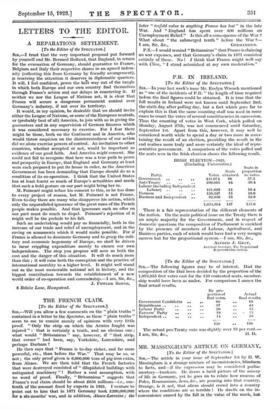P.R. IN IRELAND.
[To the Editor of the SPECTATOR.] Sin,—In your last week's issue Mr. Evelyn Wrench mentioned as "one of the incidents of P.R. " the length of time required before the final figures could be obtained. It is true that the full results in Ireland were not known until September 2nd, the sixth day after polling day, but a fact which goes far to explain this is that the same counting staff was used in some cases to count the votes of several constituencies in succession. Thus the counting of votes in West Cork, which polled on Monday, August 27th, was not commenced until Saturday, September 1st. Apart from this, however, it may well be considered worth while to spend a day or two more in ascer- taining the result of an election, providing the result in the end realises more truly and more certainly the ideal of repre- sentative government. A comparison of the votes polled and the seats won in the Irish election shows the following result.
IRISH ELECTION-1923.
(Excluding Universities.) Seats Seats in proportion Party. Votes. obtained, to votes.
Government .. •• • • 441,074 60 57.3 Anti-Treaty .. .. 290,001 44 40.4 Labour (including Independent
Labour) .. .. ..
181,028 15 18.4 Farmers .. .. 129,247 15 18.0 Business and Independent .. 92,859 13 12.9
1,051,804 147 147.0
There is a fair representation of the different elements of the nation. On the main political issue on the Treaty there is an ample majority for the Government, and in respect of domestic questions the composition of Parliament is enriched by the presence of members of Labour, Agricultural, and Business parties, each of which would have had a very meagre success but for the proportional system.—! am, Sir, &c., ALFRED J. GRAY,
Assistant Secretary, The Proportional Representation Society.


































 Previous page
Previous page